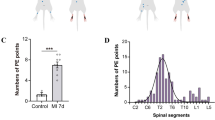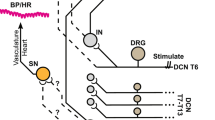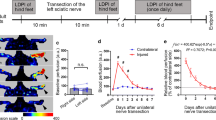Abstract
Objectives
Spinal cord injury results in loss of supraspinal control of sympathetic outflow, yet preservation of spinal reflexes. Given the importance of reflex activation of sympathetic vasoconstrictor neurones to the generation of autonomic dysreflexia, we assessed the input–output relationship of the spinal somatosympathetic reflex induced by electrical activation of cutaneous afferents over the lower abdominal wall.
Methods
In 13 spinal cord-injured subjects (C4-T10) we tested the hypothesis that the magnitude and duration of the vasoconstriction is directly related to the magnitude and duration of the stimulus train. Cutaneous vasoconstriction was measured with photoelectric plethysmography over a finger and toe; continuous blood pressure was recorded by radial artery tonometry, heart rate by ECG chest electrodes and sweat release by skin conductance. Four sets of trains of cutaneous electrical stimuli (20 Hz 1 s, 20 Hz 20 s, 20 Hz 1 s alternating on-and-off for 20 s and 1 Hz 20 s) were applied to the abdominal wall (10 mA) at 2-min intervals.
Results
Nine subjects showed vasoconstrictor responses to the stimulus trains. On average, both the magnitude and duration of the responses were similar irrespective of the type of stimulus train.
Interpretation
We conclude that there is a non-linear relationship between somatic inputs and sympathetic vasoconstrictor outputs, and argue that a sustained vasoconstriction need not imply continuous sensory input to the spinal cord.


Similar content being viewed by others
References
Beacham WS, Perl ER (1964) Background and reflex discharge of sympathetic preganglionic neurones in the spinal cat. J Physiol 172:400–416
Beacham WS, Perl ER (1964) Characteristics of a spinal sympathetic reflex. J Physiol 173:431–448
Brown R, Engel S, Wallin BG, Elam M, Macefield V (2007) Assessing the integrity of sympathetic pathways in spinal cord injury. Auton Neurosci 134:61–68
Burton AR, Brown R, Macefield V (2008) Selective activation of muscle and skin nociceptors does not trigger exaggerated sympathetic responses in spinal-injured subjects. Spinal Cord 46:660–665
Cariga P, Catley M, Mathias CJ, Savic G, Frankel HL, Ellaway PH (2002) Organisation of the sympathetic skin response in spinal cord injury. J Neurol Neurosurg Psychiatry 72:356–360
Coote JH, Downman CBB (1966) Central pathways of some autonomic reflex discharges. J Physiol 183:714–729
Coote JH, Downman CBB, Weber WV (1969) Reflex discharges into thoracic white rami elicited by somatic and visceral afferent excitation. J Physiol 202:147–159
Fuhrer MJ (1971) Skin conductance responses mediated by the transected human spinal cord. J Appl Physiol 30:663–669
Fuhrer MJ (1975) Effects of stimulus site on the pattern of skin conductance responses evoked from spinal man. J Neurol Neurosurg Psychiatry 38:749–755
Guttmann L, Whitteridge D (1947) Effects of bladder distention on autonomic mechanisms after spinal cord injuries. Brain 70:361–404
Horeyseck G, Jänig W (1974) Reflex activity in postganglionic fibres within skin and muscle nerves elicited by somatic stimuli in chronic spinal cats. Exp Brain Res 21:155–168
Jänig W, Spilok N (1978) Functional organization of the sympathetic innervation supplying the hairless skin of the hindpaws in chronic spinal cats. Pflugers Arch 377:25–31
Karlsson AK, Friberg P, Lînnroth P, Sullivan L, Elam M (1998) Regional sympathetic function in high spinal cord injury during mental stress and autonomic dysreflexia. Brain 121:1711–1719
Kerman IA, Yates BJ (1999) Patterning of somatosympathetic reflexes. Am J Physiol Regul Integr Comp Physiol 277:R716–R724
Lin CS, Macefield VG, Elam M, Wallin BG, Engel S, Kiernan MC (2007) Axonal changes in spinal cord injured patients distal to the site of injury. Brain 130(4):985–994
Marsh DR, Weaver LC (2004) Autonomic dysreflexia, induced by noxious or innocuous stimulation, does not depend on changes in dorsal horn substance. J Neurotrauma 21:817–828
Mathias CJ, Frankel HL (2002) Autonomic disturbances in spinal cord lesions. In: Mathias CJ, Bannister R (eds) Autonomic failure: a textbook of clinical disorders of the autonomic nervous system, 4th edn. Oxford University Press, Oxford, pp 494–513
Mathias CJ (2006) Orthostatic hypotension and paroxysmal hypertension in humans with high spinal cord injury. Prog Brain Res 152:231–243
Maynard FM Jr, Bracken MB, Creasey G, Ditunno JF Jr, Donovan WH, Ducker TB, Garber SL, Marino RJ, Stover SL, Tator CH, Waters RL, Wilberger JE, Young W (1997) International Standards for Neurological and Functional Classification of Spinal Cord Injury. American Spinal Injury Association. Spinal Cord 35:266–274
Ogura T, Kubo T, Lee K, Katayama Y, Kira Y, Aramaki S (2004) Sympathetic skin response in patients with spinal cord injury. J Orthop Surg (Hong Kong) 12:35–39
Reitz A, Schmid DM, Curt A, Knapp PA, Schurch B (2003) Autonomic dysreflexia in response to pudendal nerve stimulation. Spinal Cord 41:539–542
Saper CB, DeMarchena O (1986) Somatosympathetic reflex unilateral sweating and pupillary dilatation in a paraplegic man. Ann Neurol 19:389–390
Sato A, Schmidt RF (1971) Spinal and supraspinal components of the reflex discharges into lumbar and thoracic white rami. J Physiol 212(3):839–850
Sato A, Schmidt RF (1973) Somato-sympathetic reflexes: afferent fibres, central pathways, discharge characteristics. Physiol Rev 53(4):916–947
Sheel W, Krassioukov A, Inglis T, Elliott L (2005) Autonomic dysreflexia during sperm retrieval in spinal cord injury: influence of lesion level and sildenafil citrate. J Appl Physiol 99:53–58
Teasell RW, Arnold JM, Krassioukov A, Delaney GA (2000) Cardiovascular consequences of loss of supraspinal control of the sympathetic nervous system after spinal cord injury. Arch Phys Med Rehabil 81(4):506–516
Wallin BG, Stjernberg L (1984) Sympathetic activity in man after spinal cord injury. Outflow to skin below the lesion. Brain 107(Pt 1):183–198
Yeoh M, McLachlan EM, Brock JA (2004) Tail arteries from chronically spinalized rats have potentiated responses to nerve stimulation in vitro. J Physiol 556:545–555
Author information
Authors and Affiliations
Corresponding author
Rights and permissions
About this article
Cite this article
Brown, R., Burton, A. & Macefield, V.G. Input–output relationships of a somatosympathetic reflex in human spinal injury. Clin Auton Res 19, 213–220 (2009). https://doi.org/10.1007/s10286-009-0010-9
Received:
Accepted:
Published:
Issue Date:
DOI: https://doi.org/10.1007/s10286-009-0010-9




